
I told Midjourney how I was feeling writing this blog post, and a little bit about what I looked like, and this is how it pictured me.
Over the last few months, two questions keep coming to mind when I read and think about what seems to be going on in the world:
- Why do we seem inclined to select/elect/allow the emergence of ‘leaders’ — government, corporate, and social — who are evidently quite dimwitted? They appear to be more informed (and more misinformed), and somewhat more sociopathic, than average citizens, but they also seem really remarkably incapable of critical thinking. Do we get comfort from knowing we’re smarter than the people running things and making key decisions for us? Watch/read any speeches by any of these clowns. How in the world were they ever granted so much power? Figureheads to front the people with the real power who stay behind the scenes? Who put the bozos in charge of driving the bus, and why?
- Why is it somehow harder to accept that there’s a quite high, and growing, probability that the human experiment of life on earth will now end in nuclear war, rather than in civilizational collapse caused by the collapse of unsustainable global ecological and economic systems? Why is the thought of the former somehow more unbearable than the latter? If it’s all the inevitable result of eight billion apes conditioning each other and doing our best, it shouldn’t make any difference how it all ends. So why does it?
I have absolutely no answer to these questions.
COLLAPSE WATCH
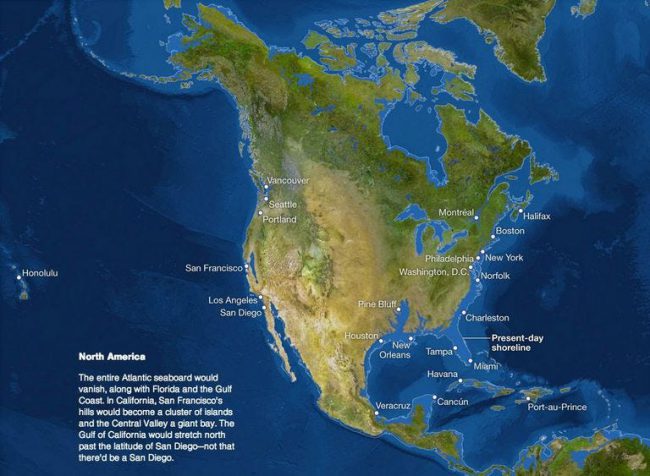
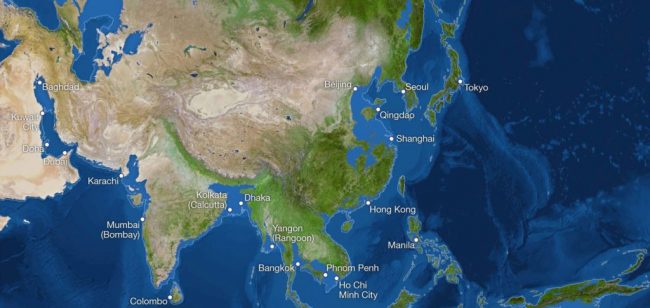
images from National Geographic via Naked Capitalism; these images show new coastlines once the Arctic and Antarctic melting already baked in to current CO2e levels occurs over the coming decades; this is not a ‘possible’ scenario — it is the minimum change that WILL occur even if we immediately and aggressively strive to reach carbon zero, and will force at least 3B people to move, including all residents of the cities shown
(thanks to Just Collapse and John Whiting for several of these links)
10ºC temperature rise and 60m sea level rise now baked in: James Hansen’s latest study tells the sad tale. We may survive another century or more, but the millennial endgame looks more and more like species (and possibly all-life-on-earth) extinction. Guy is looking prescient.
424ppm Co2 and accelerating: This is the most carbon in the atmosphere in at least three million years, and ‘actions’ to date have not even slowed the increase. This level of pollution correlates to temperatures that are incompatible with human life.
Carbon capture and sequestering is an expensive fraud: Richard Heinberg explains why it has never worked and is never likely to work, and focus on it is wasting precious time and money that could be better spent on other mitigation projects.
Our cities are in their last century: Bill Rees explains why they will have to be abandoned (even those not under water).
And El Niño is just weighing in: And early signs are that it will be a major one, pushing us well past the 1.5ºC mark.
As we get nearer and nearer to economic collapse: Tim Watkins explains: “The authorities are doing two things – managing economic expectations downwards, whilst [falsely] reassuring the public about the viability of a financial system hopelessly mired in debt. They [have allowed] the financial system to be stretched to the breaking-point in the hubristic pursuit of the chimera of infinite growth.”
As El Salvador shows us what happens when economic and ecological collapse leads to political collapse: There’s a very good reason that millions are trying to flee this utterly failed “prison state”.
And still, the humanists and technophiles tell us there’s time: Noam Chomsky and Robert Pollin daydream in technicolour about a “just transition”, ignoring the scientific realities.
Time to get real: Instead, Indrajit Samarajiva reminds us that, for the rest of our existence, even bare survival will require sacrifice, something we refuse to countenance. And Michael Dowd explains that climate change is just one small part of the larger driver of extinction, ecological overshoot, and suggests some ways to learn to accept the inevitability of that extinction.
Chris Hedges writes a requiem for our species: “Death is hard to digest until the final moments of existence, and even then, many cannot face it. We are composed of the rational and the irrational. In moments of extreme distress we embrace magical thinking. We become the easy prey of con-artists, cult leaders, charlatans and demagogues who tell us what we want to hear.” Until, finally, we stop listening to their ravings, and start to face the truth.
LIVING BETTER
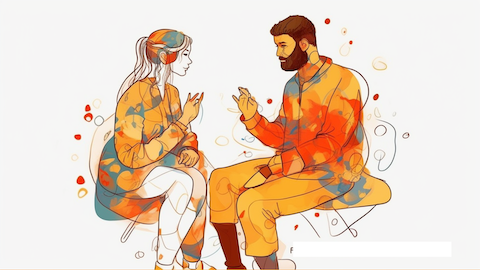
Midjourney’s take on “Deep Conversation”; not my prompt
A call for détente and collaboration with Russia instead of war: Of course, it was written 60 years ago today, and made by JFK, but it’s as pertinent as ever. And alarming that current ‘leaders’ are saying the exact opposite.
Better ways to deliver health care: Holistic community health centres are a proven model whose time has come. And the much-aligned and starved NHS is still one of the world’s best systems.
How central bank digital currencies could wrest economic and financial control back from private bank oligopolies: Yanis Varoufakis explains how we could easily return financial decision-making to the public sphere.
Domestic partners, not professional athletes, are overwhelmingly the main sufferers of concussions: It took a sports star to shine the light on this little-reported atrocity.
Michael J Fox shows the horrors of Parkinsons: The now-reclusive former child star reveals what the disease does even to a young body, and what it takes to cope.
Let’s end the farce of useless competitive performance reviews: Annual performance reviews rating staff ‘on the curve’ are intimidating and counter-productive.
“I mourn the weakness of my attention”: In a lovely ode to a brave and uncelebrated plant, Flatcaps & Fatalism reminds us of our duty to notice what’s important, and the folly of living too much in our own heads.
POLITICS AND ECONOMICS AS USUAL
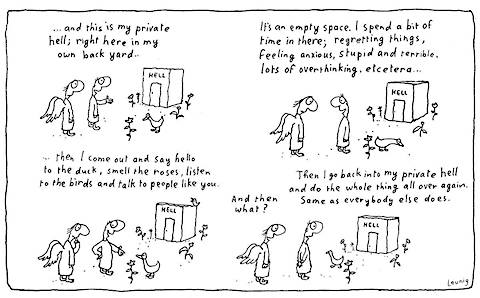
cartoon by Michael Leunig, of course
Nobody voted for this: Caitlin Johnstone reminds us that our dysfunctional political system has narrowed and subverted our democratic choices to a vote for indistinguishable Tweedles. No truly democratic system would have reduced our choices to Biden/Trump, Trudeau/Poilievre, or Sunak/Starmer. They’re an insult to our intelligence.
The war we’re finally allowed to see: One reporter at the New Yorker has at least temporarily broken ranks and reported factually on the ruined state of Ukraine and its broken ‘army’. We still have to turn to ‘alternative’ sites for news about the utter debacle of the Ukrainian ‘counter-offensive’ that has been a complete suicide mission for Ukraine’s miserable conscripts, and about the despicable Ukrainian/UK-assisted bombing of the Kakhovka dam in the Donbas.
The dumbing of America: Back in 1995, the late Carl Sagan warned of the terrible consequences of a decline in education and critical thinking and an increase in propaganda and censorship in the US.
Corpocracy, Imperialism & Fascism: Short takes (thanks to John Whiting for many of these links):
- The real costs of war — a treasure trove of useful, terrifying data.
- Is Biden purging all the pacifists from his administration in preparation for launching his war against China?
- Drawings by the “forever prisoner”, never charged and endlessly tortured for decades at Guantanamo.
- The cynical and completely unnecessary debt ceiling “deal” allows Biden to renege on all his promises to progressives.
- A form of AI has been abusing its power and subverting human rights and freedoms for centuries: It’s called a “corporation”.
- Journalism, protesting and free speech are facing more and more restrictions in ‘democratic’ countries.
- Megapolluter Suncor wrote parts of Canada’s new climate plan, including misinformation about carbon capture and storage.
- In support of its corporate ideological buddies, the US Supreme Court has unilaterally removed most protections of US wetlands.
- F-16s for Ukraine, and more munitions to attack Crimea.
- John Mearsheimer updates us on the proxy war in Ukraine.
- UN expert Alfred de Zayas also weighs in on the war.
- a new book exhaustively explains how the US deliberately provoked the war in Ukraine.
- Why neoliberalism has come to endorse totalitarian principles
- Why the US supported the 2022 military overthrow of Pakistan’s government.
- Trump’s actions and record as president were not significantly different, and no worse, in any sense, than Obama’s or Biden’s.
Propaganda, Censorship, Misinformation and Disinformation: Short takes:
- The final Russiagate report didn’t talk about the massive Clinton/mainstream media anti-Trump misinformation program because that “wasn’t in its mandate”.
- Big Ag systematically lies about the dangers of factory-farmed meats.
- RFK Jr is a disgusting anti-vaxxer.
- Bakhmut/Artyomovsk has fallen to the Russians, despite Zelenskyy’s bleatings faithfully transcribed as facts by the mainstream media.
- The pro-peace Eisenhower network had to buy an ad in the NYT in order to get its plea for peace to the public.
- Canada’s phony “Chinese interference scandal” in which “Hyper-partisan politics and shoddy reporting created a dangerous frenzy”.
- 15 reasons mass media employees spout propaganda (hint: they actually believe they’re doing the right thing) — an important read.
- Strange bedfellows the WSJ and Amnesty International caught in complete fabrications about China.
FUN AND INSPIRATION
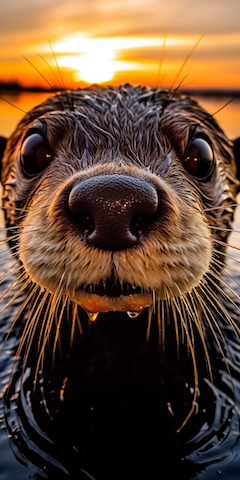
Midjourney imagines an otter popping up to say hi!; not my prompt
The Lakota Ghost Dancers: A chilling read about a First Nations people culturally destroyed, and then, ironically, slaughtered at Wounded Knee in part for performing a forbidden dance in honour of The (Christian) Rapture.
Dooce finally finds peace: Long-time blogger Heather B Armstrong, aka Dooce, who wrote courageously, vulnerably, and witheringly for years about her battle with depression and addiction, took her own life recently. This was her last post, dedicated to her daughter. Indrajit has written a tribute to her. Unless you’ve suffered from the Noonday Demon, it may be hard to sympathize with her, but I do. She also introduced me to some great music, like the songs of Deep Sea Diver, whose lyrics (and guitar licks) are raw and gut-wrenching. One song goes: “I tried so hard not to let you all down. It’s an impossible weight. So I’ll just let you down now.” Fuck.
Rebecca Watson sets the record straight: My new favourite tilter at windmills has been skewering people who aren’t used to being skewered (or at least not with this kind of rigour):
- Sabine Hossenfelder is a sharp-witted, articulate, brilliant, world-class scientist. But on trans kids care, she just gets it wrong.
- Rebecca also takes on Elon Musk and Matt Taibbi for contributing to the spread of the kinds of misinformation they claim to be trying to combat.
- The late, grotesque, Pat Robertson is an easy target.
- But most delightfully, she lampoons the cringeworthy Intellectual Dark Web narcissists (Eric Weinstein, Sam Harris et al) — a group she knows quite well — for, among other things, their misogyny and their credulousness about UFOs.
The complex identity of modern Iran: A fascinating interview and feminist perspective on the history of this multicultural, enduring nation and how it is evolving.
How drones helped track and rescue a lost pet: A modern shaggy dog story.
Those magic major sevenths: Nahre Sol describes why Erik Satie’s Gymnopédie #1 is so haunting.
AI is mostly just pattern recognition: Billmon at Moon of Alabama, who has an educational background in IT, thinks concerns about AI are somewhat overblown, and the real danger is idiot humans misusing it.
The government of Canada has a style manual: How to write (and speak) Canayjun. Fascinating and sometimes unintentionally funny. Their gender-inclusiveness section is especially interesting, reflecting Canadians’ inevitably awkward attempts to make everyone happy. Sorry!
Crosswordese: Wikipedia has a page of those short words you’ll find in even the most finely-crafted crosswords, but never encounter in the real world. Regular cruciverbalists will smile and nod (even though ATM is significantly missing from the list).
THOUGHTS OF THE MONTH
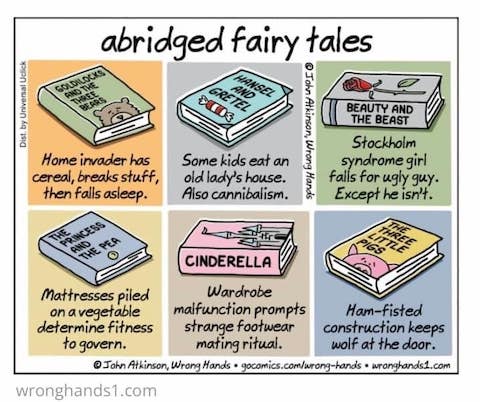
cartoon by John Atkinson
From Aurélien, on our penchant for seeking ‘legal’ revenge on those we don’t like:
[There is inevitably] a tension between the atavistic desire for punishment and revenge, and the concern to erect at least a minimal legal umbrella to make us feel less like characters from Hamlet. But the effect of this tension has been to degrade political speech everywhere. It’s common now to see individuals we don’t like referred to as “war criminals:” a meaningless term that can only be parsed as “people I don’t like and who I would wish to see in front of a court and convicted on some charge or other so I can feel better.” One way or another. Questions like “why is Henry Kissinger not on trial in The Hague?”, much posed recently, are not intended to be taken literally, since five minutes’ Internet search on jurisdiction will provide an answer. The real question is “why does the world not arrange itself to suit my desires for punishment and revenge?” We have a choice, and we can live in the world of Hamlet and Al Capone, or we can live in a law-based world where we have to accept that we can’t always have what we want. But in practice, all of us would actually like to live in both worlds according to circumstances, even if we would be ashamed to admit it.
From Billy Collins in this performance:
MONDAY
The birds are in their trees,
the toast is in the toaster,
and the poets are at their windows.
They are at their windows
in every section of the tangerine of earth–
the Chinese poets looking up at the moon,
the American poets gazing out
at the pink and blue ribbons of sunrise.
The clerks are at their desks,
the miners are down in their mines,
and the poets are looking out their windows
maybe with a cigarette, a cup of tea,
and maybe a flannel shirt or bathrobe is involved.
The proofreaders are playing the ping-pong
game of proofreading,
glancing back and forth from page to page,
the chefs are dicing celery and potatoes,
and the poets are at their windows
because it is their job for which
they are paid nothing every Friday afternoon.
Which window it hardly seems to matter
though many have a favorite,
for there is always something to see–
a bird grasping a thin branch,
the headlight of a taxi rounding a corner,
those two boys in wool caps angling across the street.
The fishermen bob in their boats,
the linemen climb their round poles,
the barbers wait by their mirrors and chairs,
and the poets continue to stare at the cracked birdbath
or a limb knocked down by the wind.
By now, it should go without saying
that what the oven is to the baker
and the berry-stained blouse to the dry cleaner,
so the window is to the poet.
Just think–
before the invention of the window,
the poets would have had to put on a jacket
and a winter hat to go outside
or remain indoors with only a wall to stare at.
And when I say a wall,
I do not mean a wall with striped wallpaper
and a sketch of a sailboat in a frame.
I mean a cold wall of fieldstones,
the wall of the medieval sonnet,
the original woman’s heart of stone,
the stone caught in the throat of her poet-lover.
From Indrajit Samarajiva on how China has wrested leadership from the US and the west in the brokering of peace, in tackling ecological collapse, in most of the sciences and technologies, and many other areas, and the US’s and west’s response has been to threaten them with war for daring to make them look bad:
America simply has no plan for climate collapse, nor can they execute anything anymore. China has a plan and ability, but America just wants to fight them over dumb shit. Meanwhile the rest of the world is caught in between like da fuq? In the middle of catastrophic global heating, you want to start a Cold War? Is that really the priority right now? America should be working with and following Chinese leadership on climate just as they should have followed China’s valiant efforts to fight COVID. Instead — just as with COVID — they’re propagandizing against China, doing nothing, and the whole world burns because they still ‘lead’ us (with a chain, and a club).





regarding your questions at the top of this thread: i don’t find the first particularly interesting, but the second really resonates, & i too struggle to find an answer:
“Why is it somehow harder to accept that there’s a quite high, and growing, probability that the human experiment of life on earth will now end in nuclear war, rather than in civilizational collapse caused by the collapse of unsustainable global ecological and economic systems? Why is the thought of the former somehow more unbearable than the latter? If it’s all the inevitable result of eight billion apes conditioning each other and doing our best, it shouldn’t make any difference how it all ends. So why does it?”
“….So why does it?”
maybe, in part, because even though our nuclear predicament has been many years, countries, people in the making, we have this mental image of a single person with his finger on the button. so there’s the illusion that unlike “unsustainable global ecological and economic systems,” nuclear war comes down to a single person’s choice.
it feels more difficult to say – à la pogo – “the enemy is US,” ie our trample-the-earth lifestyle, & easier to say “the enemy is HIM or THEM (the evil world leader or government).”
in the case of nuclear war, it’s harder to accept responsibility. so: it feels somehow more unfair.
Yes, foglight, I think that’s a key part of it. Perhaps another part of it is that, if we blow up the world knowing that MAD was inevitable if we didn’t restrain ourselves, then it reflects badly on us as a species that is supposedly ‘sapiens’, more than if the end comes via collapse of systems so complex that it was impossible to know we’d triggered fatal reinforcing feedback loops until it was too late to change course.